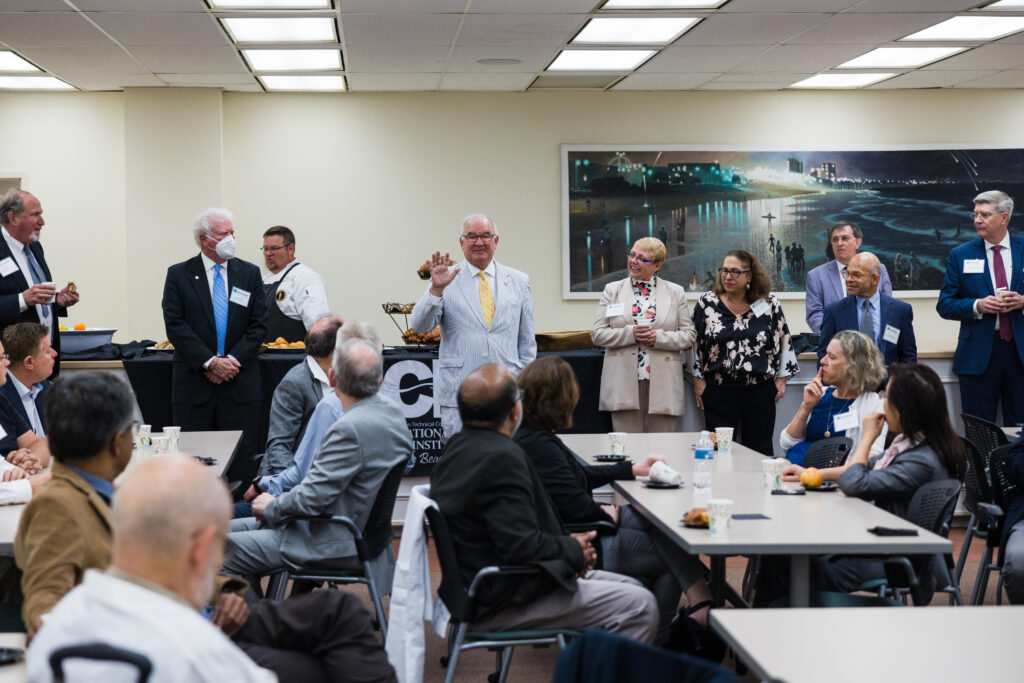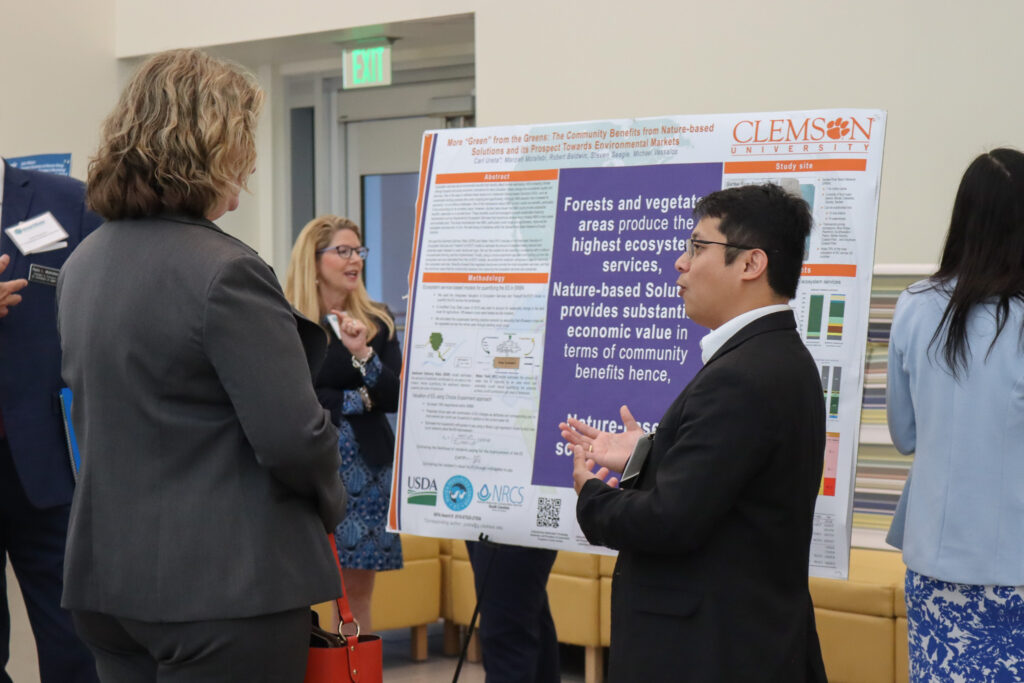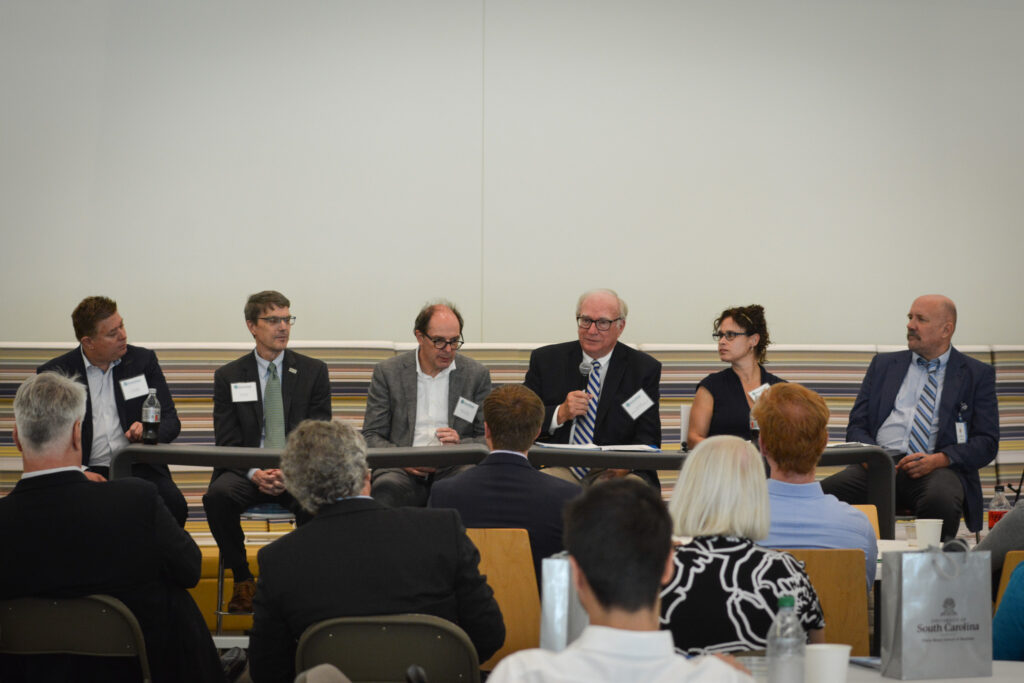“Legacy is not what I did for myself. It is what I am doing for the next generation.”
Vitor Belfort
The legacy of the SmartState® Program is not only the positive infrastructure that has been built by the program over the last 20 years, but also the extraordinary level of innovation and workforce development that has been created in our state. The SmartState legacy has been etched in the groundbreaking research conducted by world-renown experts recruited to the University of South Carolina, Clemson University and the Medical University of South Carolina. In turn, the SmartState Endowed Chairs have built economic growth and competitive advantage on a global scale. They have fostered a knowledge economy that has created a bigger narrative for our state’s future. In short, SmartState has laid the groundwork for a better tomorrow in South Carolina.
The state’s first-of-its-kind program celebrated its 20th anniversary with an evening reception at the Commission on Higher Education on May 10, 2022 followed by a milestone Legislative Breakfast at the South Carolina State House and the Council of Chairs Forum at the Darla Moore School of Business on May 11.
“I am honored to be a part of the SmartState story,” says Laura B. Cardinal, Ph.D., Endowed Chair of SC Innovates®, who served as Chair of the Council of Chairs and the Forum’s M.C. “What a moment in history to be here today reflecting on the last 20 years of success this program has experienced.”
The breakfast welcomed more than 70 senators, representatives, and staff members. It was catered by the award-winning Executive Pastry Chef, Geoffrey Blount and his students from the International Culinary Institute of Myrtle Beach. Blount, who was a 2019 Food Network finalist, supplied handmade pastries and fresh brewed coffee for breakfast attendees. Total, more than 100 people participated in the breakfast.

“Many of our current legislators were not in office when SmartState began 20 years ago,” says Cardinal. “This anniversary gathering allowed us to expose our program to those who might not be familiar with all of our achievements and milestones. It was a great opportunity to reacquaint the legislators with SmartState and share our returns on their investments over the last 20 years.”
The day transitioned from the State House to the Moore School around 10:00 a.m. where students presented posters of their research to share with SmartState leaders, scientists, industry partners, and other guests. Rusty Monhollon, President and Executive Director of the South Carolina Commission on Higher Education, welcomed participants to the Council of Chairs Forum and acknowledged the program’s exceptional worth for continued funding and support from the legislature.
“The SmartState Program is building the next generation of workforce development for South Carolina. I was thrilled to see the turnout we had at this morning’s breakfast. What a great networking opportunity for us to promote our mission and ask for continued funding,” remarked Monhollon. “As we see the work these research students have presented here today, we take a glimpse into the future. They are the young blood moving forward. It is thanks to programs like these that make this possible. It is my promise to you that I will continue to advocate for its funding at every chance I get.”

The Forum boasted a well-received session from Joey Von Nessen, Ph.D., Research Economist from the Moore School, who spoke about the SmartState economic impact across South Carolina. “To be successful, our state requires a workforce to engage in innovation and commercialization. Regions of South Carolina and the country in general that are growing at the fastest rate have strong and vibrant knowledge economies with plentiful natural resources. The economic impact of this program is evident in our state’s employment numbers and labor income, both which reflect economic prosperity.”
Von Nessen explained the SmartState’s employment multiplier effect, and that its employment generation is much higher than the average industry in South Carolina. He reported that SmartState has created 19,465 jobs with the average salary of $77,613. He says the return on investment of the SmartState Program is $3.9 billion since its inception.
“The bottom line,” says Von Nessen, “is that SmartState continues to support growth and development of a knowledge-based economy, which contributes to higher rates of economic growth and quality of life for South Carolina.”
The Forum also included conversations from two panels and a keynote speaker. The first panel featured the HudsonAlpha Institute for Biotechnology, which is similar in age to the SmartState Program. The public-private partnership, which is based in Birmingham, Alabama, allowed participants to hear from a similar conglomerate to that of SmartState that has experienced much success since its inception.
Participants enjoyed enlightening dialogue with an industry panel, many of whom spoke at various times throughout the day and kept things intriguing with their complimentary yet unique perspectives. Moderated by Lori McMahon, Ph.D., MUSC’s Vice President for Research, the industry panel discussed with audience the importance of collaboration among researchers, universities and businesses. One panelist spoke to the triangle of academia, industry, and government and how they work together to feed one another.

Overall, the panelists and attendees concurred that fundamentally, academia and industry don’t fully understand each other but through a knowledge-based connection like SmartState, a meaningful step has been taken to bridge this gap and that deeper collaboration will further drive South Carolina’s knowledge economy, workforce development and economic success.
“Twenty years ago, our story began when leaders representing a wide range stakeholders came together and founded the SmartState Program,” acknowledged Cardinal as she adjourned the group for the day. “I look forward to the next 20 years of SmartState as the leadership from the state’s research universities, industry, government and legislature continue these conversations and shape the next phase of SmartState’s lifecycle.”